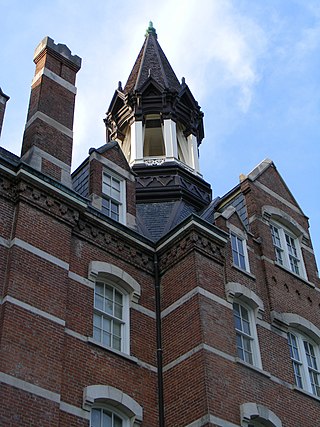
Fisk University is a private historically black liberal arts college in Nashville, Tennessee. It was founded in 1866 and its 40-acre (16 ha) campus is a historic district listed on the National Register of Historic Places.

Vanderbilt Peabody College of Education and Human Development is the education school of Vanderbilt University, a private research university in Nashville, Tennessee. Founded in 1875, Peabody had a long history as an independent institution before merging with Vanderbilt University in 1979. The school is located on the Peabody Campus of Vanderbilt University in Nashville. The academic and administrative buildings surround the Peabody Esplanade and are southeast of Vanderbilt's main campus.

Mount Olivet Cemetery is a 206-acre (83 ha) cemetery located in Nashville, Tennessee. It is located approximately two miles East of downtown Nashville, and adjacent to the Catholic Calvary Cemetery. It is open to the public during daylight hours.

The Tennessee State Capitol, located in Nashville, Tennessee, is the seat of government for the U.S. state of Tennessee. It serves as the home of both houses of the Tennessee General Assembly–the Tennessee House of Representatives and the Tennessee Senate–and also contains the governor's office. Designed by architect William Strickland (1788–1854) of Philadelphia and Nashville, it was built between 1845 and 1859 and is one of Nashville's most prominent examples of Greek Revival architecture. The building, one of 12 state capitols that does not have a dome, was added to the National Register of Historic Places in 1970 and named a National Historic Landmark in 1971. The tomb of James K. Polk, the 11th president of the United States, is on the capitol grounds.

Martin Luther King Jr. Academic Magnet for Health Sciences and Engineering at Pearl High School is a public magnet high school located in Nashville, Tennessee. MLK includes grades 7–12, and students enter through a lottery process similar to the other magnet schools in Nashville.

Jubilee Hall is the oldest academic building on the campus of Fisk University in Nashville, Tennessee, United States. Completed in 1876, it was the university's first permanent building, and is a good local example of Gothic Revival architecture. It was designated a National Historic Landmark in 1974, in recognition of the university's place as one of the first historically black colleges and universities to be established after the American Civil War. It presently serves as an undergraduate residence hall. In 2017 the Tennessee Historical Commission installed a marker honoring the Fisk Jubilee Singers, whose 1870s European tour raised the funds to pay for the building's construction.
William Augustus Edwards, also known as William A. Edwards was an Atlanta-based American architect renowned for the educational buildings, courthouses and other public and private buildings that he designed in Florida, Georgia and his native South Carolina. More than 25 of his works have been listed on the National Register of Historic Places.

The Jennings Carnegie Public Library is a Carnegie library located at 303 North Cary Avenue in Jennings, Louisiana.

Bridgeforth High School in Pulaski, Tennessee, was Giles County, Tennessee's, first high school for African Americans. It opened in 1937. It was named for J. T. Bridgeforth, who was one of the earliest African-American educators in the county.

Capers C.M.E. Church, is a historic Christian Methodist Episcopal church built in 1925 in Nashville, Tennessee. It is also known as Caper Memorial Christian Church, and Capers Memorial C.M.E. Church.

Albert Randolph Ross was an American architect, known primarily for designing libraries, especially those funded by Andrew Carnegie. His father, John W. Ross, was an architect based in Davenport, Iowa, and the architect of its city hall.

Nashville Public Library (NPL) is the public library system serving Nashville, Tennessee and the metropolitan area of Davidson County. In 2010, the Nashville Public Library was the recipient of the National Medal for Museum and Library Service. The library was named the Gale/Library Journal 2017 Library of the Year.

Shopbell & Company was an American architectural firm located in Evansville, Indiana, in the United States.

McKissack & McKissack is an American design, program management and construction firm based in New York. It is the oldest Black-owned architecture and construction company in the United States.

The Morris Memorial Building is a historic building in Nashville, Tennessee, United States. It was built in the 1920s for the African-American National Baptist Convention, USA, Inc. and was named for longtime president Elias Camp Morris.

Clarence Kelley Colley (1869–1956) was an American architect. He designed many buildings in Tennessee, some of which are on the campuses of Middle Tennessee State University and Austin Peay State University. Other buildings are listed on the National Register of Historic Places.

Wilkinson House is a historic house in Joelton, Tennessee, USA.

The Turner Normal and Industrial School (1886–1932) was a private school affiliated with the AME Church, for African American students in Shelbyville, Tennessee, United States. It existed initially as a secondary school and school of theology, and later as an industrial school, normal school, and college preparatory school. For the last two years, the school was moved to Memphis, Tennessee. It was also known as the Shelbyville High School, Turner Industrial School, Turner Normal School, and Turner College.
Moses McKissack III (1879–1952), was an American architect. He had his own architecture firm McKissack Company from 1905 until 1922, and was active in Tennessee and Alabama. In a partnership with his brother Calvin Lunsford McKissack, they founded the architecture firm McKissack & McKissack in 1922.



















